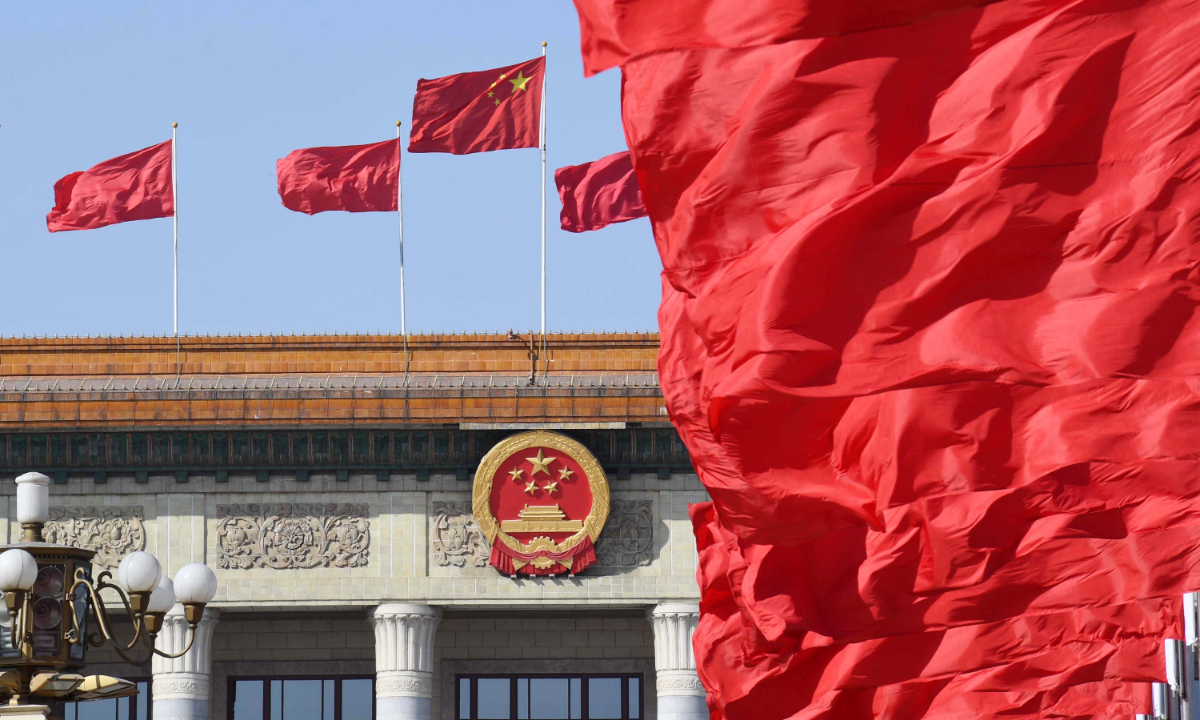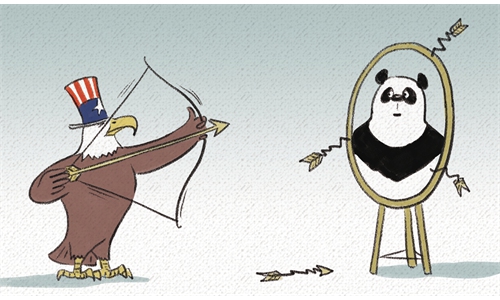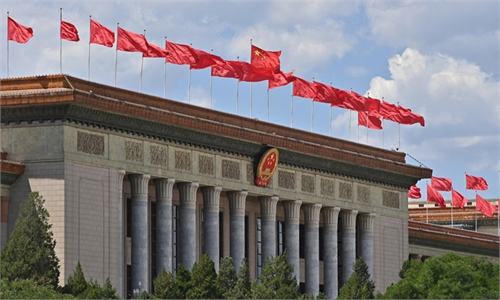20th CPC Central Committee issues communiqué after its 2nd plenary session
Reform of Party and state institutions to ‘meet demand of new devt stage’

Flags are seen at the Tian'anmen Square and atop the Great Hall of the People. Photo:Xinhua
The 20th Communist Party of China (CPC) Central Committee issued a communiqué at the end of its second plenary session on Tuesday. The communiqué said the plenary session adopted a plan for the reform of Party and state institutions. Analysts said the reform will reflect the demands of the new development stage and the profound changes of the international situation.Xi Jinping, general secretary of the CPC Central Committee, made an important speech at the three-day session, which was presided over by the Political Bureau of the CPC Central Committee, the Xinhua News Agency reported on Tuesday.
A total of 203 full members and 170 alternate members of the CPC Central Committee attended the session. Deputy secretaries of the CPC Central Commission for Discipline Inspection and leading officials of related departments were present in a non-voting capacity.
At the session, the CPC Central Committee heard and discussed a work report presented by Xi, who was entrusted by the Political Bureau of the CPC Central Committee.
The session adopted a list of proposed candidates for the leading positions of state institutions to be recommended to the first session of the 14th National People's Congress (NPC), and a list of proposed candidates for the leadership of the Chinese People's Political Consultative Conference (CPPCC) National Committee to be recommended to the first session of the 14th CPPCC National Committee.
The plenary session decided to recommend the two lists to the presidium of the first session of the 14th NPC and the presidium of the first session of the 14th CPPCC National Committee, according to the communiqué.
The plenary session adopted a plan for the reform of Party and state institutions. Xi delivered explanatory remarks on the draft plan at the session. The session agreed to put part of the reform plan to the first session of the 14th NPC for deliberation in accordance with due legal procedures.
The CPC Central Committee also held a consultative meeting Tuesday to hear opinions and inform non-Communist political parties, the All-China Federation of Industry and Commerce and personages without party affiliation of the plan on the reform of Party and state institutions, Xinhua reported.
Xi, also Chinese president and chairman of the Central Military Commission, presided over the meeting and delivered an important speech.
Xi said at the meeting that, in general, the reform of Party and state institutions this time highlights key industries and fields and is more precise with more strengths. It involves a wide range of areas and goes deeper in affecting vested interests in an effort to solve significant difficulties and problems that concern the society. It will have an important impact on economic and social development, he said.
The communiqué of the second plenary session also said, "At present, the profound changes of the world unseen in a century are accelerating, and the world has entered a new period of turmoil and change. Our country's development has entered a period in which strategic opportunities, risks and challenges coexist, with increasing uncertainty and unpredictability."
Experts said it shows that the CPC will base its strategy and planning for the future on how to better seize opportunities and overcome challenges and risks in a world in turbulence.
Zhang Shuhua, director of the institute of political sciences at the Chinese Academy of Social Sciences, told the Global Times on Tuesday that "the reform of Party and state institutions" mentioned in the communiqué is based on the needs of the new development stage, and reflects the demand of the world which is experiencing profound changes that have not been seen in a century.
The world has indeed entered a turbulent period given the Russia-Ukraine conflict, the China-US tensions, climate change, as well as food, energy and nuclear crises, said Li Haidong, a professor at the Institute of International Relations at the China Foreign Affairs University.
The communiqué said that "Efforts are needed to deepen institutional reform in key areas and ensure that the Party's leadership over socialist modernization becomes more refined in institutional setup, more optimized in the division of functions, more improved in institutions and mechanisms, and more efficient in operation and management."
"All local authorities and departments should fully appreciate the importance and urgency of the reform of Party and state institutions, and faithfully implement the tasks of institutional reform," the session stressed.
Apart from those dangers and crises that have already happened around the globe, those "black swan" and "gray rhino" incidents require more farsighted policymaking and more efficient and modernized construction of Party and state institutions, analysts said.
The reform of Party and state institutions is to make the Party's decisions more effective and scientific, and to make sure governmental departments and agencies are able to handle the new internal and external challenges. It will provide modern services to the people and effectively boost post-epidemic economic recovery and reactivate strong economic growth based on cutting-edge sci-tech achievements and innovation, experts said.




